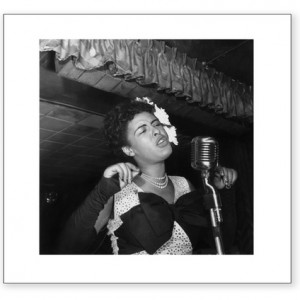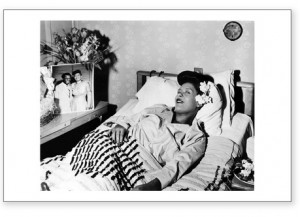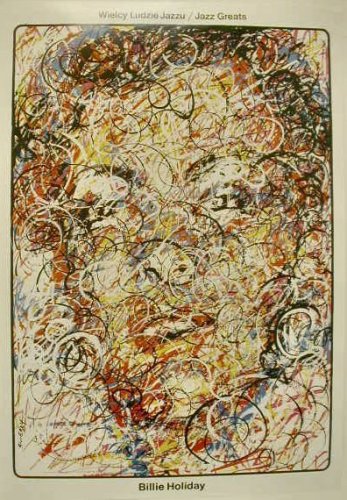Metronome Magazine: Billie Holiday
Billie Holiday (born April 7, 1915 in Philadelphia PA – July 17, 1959) American jazz singer, songwriter, and actress. Nicknamed “Lady Day” Billie Holiday had a seminal influence on jazz and pop singing. Her vocal style, strongly inspired by jazz instrumentalists, pioneered a new way of manipulating phrasing and tempo.
 “With few exceptions, every major pop singer in the US during her generation has been touched in some way by her genius. It is Billie Holiday who was, and still remains, the greatest single musical influence on me. Lady Day is unquestionably the most important influence on American popular singing in the last twenty years.” Frank Sinatra
“With few exceptions, every major pop singer in the US during her generation has been touched in some way by her genius. It is Billie Holiday who was, and still remains, the greatest single musical influence on me. Lady Day is unquestionably the most important influence on American popular singing in the last twenty years.” Frank Sinatra
EARLY YEARS & FIRST BREAK
Holiday began performing clubs in New York City in 1929, but her break came in November 1933, when producer John Hammond arranged for Holiday to make her recording debut with Benny Goodman. Singing two songs: “Your Mother’s Son-In-Law” and “Riffin’ the Scotch.” Released on November 11, under the band name “Benny Goodman & his Orchestra.” “Riffin’ the Scotch” became Holiday’s first hit, selling 5,000 copies.
FIRST RECORD DEAL
Holiday was signed to Brunswick Records by John Hammond to record current pop tunes with Teddy Wilson in the new “swing” style for the growing jukebox trade. Their first collaboration included “What a Little Moonlight Can Do,” and “Miss Brown to You (1935).”
Most of Holiday’s recordings with Wilson or under her own name during the 1930s and early 1940s are regarded as important parts of the jazz vocal library. Most of Holiday’s early successes were released under the band name “Teddy Wilson & his Orchestra.” During her stay in Wilson’s band, Holiday would sing a few bars and then other musicians would have a solo. Teddy Wilson, one of the most influential jazz pianists from the swing era, accompanied Holiday more than any other musician. He and Holiday have 95 recordings together.
In July 1936, Holiday began releasing sides under her own name. These songs were released under the band name “Billie Holiday & Her Orchestra.” Most noteworthy, the popular jazz standard “Summertime,” sold well and was listed on the available pop charts at the time at number 12, the first time the jazz standard charted under any artist.

Billie Holiday “Billie Dreams of Pops”
Photographer: Robert Asen
Year Photo Taken: 1947
An alternate photo appeared in Metronome Magazine in the May, 1947 issue, the caption read “Billie Holiday, wearing the inevitable gardenias and a becoming hairdo, even as she recuperates in a hospital bed, points out a picture of herself taken with Louis Armstrong at his Carnegie concert.”
TOURING WITH COUNT BASIE & LIFE ON THE ROAD
In late 1937, Holiday had a brief stint as a big band vocalist with Count Basie. The traveling conditions of the band were often poor and included one-nighters in clubs, moving from city to city with little stability. Holiday chose the songs she sang and had a hand in the arrangements. Bandleader, Count Basie had gotten used to Holiday’s heavy involvement in the band. He said, “When she rehearsed with the band, it was really just a matter of getting her tunes like she wanted them, because she knew how she wanted to sound and you couldn’t tell her what to do.” Songs performed included “I Must Have That Man”, “Travelin’ All Alone”, “I Can’t Get Started”, “They Can’t Take That Away from Me,” and “Summertime”
ELLA & BILLIE GO
HEAD-TO-HEAD
Holiday found herself in direct competition with popular singer Ella Fitzgerald, with whom Holiday would later become friends. Fitzgerald was the vocalist for the Chick Webb Band, who were in competition with Count Basie. On January 16, 1938, the same day that Benny Goodman performed his legendary Carnegie Hall jazz concert, the Count Basie and Chick Webb bands had a battle at the Savoy Ballroom. Chick Webb and Fitzgerald were declared winners by Metronome Magazine. Down Beat Magazine declared Holiday and Basie the winners. A straw poll of the audience saw Fitzgerald win by a three-to-one margin.
Although Holiday was unable to record in the studio with Count Basie, she did include many of his musicians in her recording dates with Teddy Wilson.
TOURING WITH ARTIE SHAW & SEGREGATED AMERICA
Holiday was hired by Artie Shaw a month after being fired from the Count Basie Band. This association placed her among the first black women to work with a white orchestra, an unusual arrangement for the times. In situations where there was a lot of racial tension, Shaw was known to stick up for his vocalist. Holiday described how she could not sit on the bandstand with other vocalists because she was black. Shaw said to her, “I want you on the band stand like … everyone else.”
When touring the American South, Holiday would sometimes be heckled by members of the audience. In November 1938 Holiday was asked to use the service elevator at the Lincoln Hotel, instead of the passenger elevator, because white patrons of the hotels complained. This may have been the last straw for her. She left the band shortly after. Holiday spoke about the incident weeks later, saying “I was never allowed to visit the bar or the dining room as did other members of the band … [and] I was made to leave and enter through the kitchen.”
BILLIE ACHIEVES RECOGNITION
By the late 1930s, Billie Holiday had toured with Count Basie and Artie Shaw, scored a string of radio and retail hits with Teddy Wilson, and became an established artist in the recording industry. Her songs “What A Little Moonlight Can Do” and “Easy Living” were being imitated by singers across America and were quickly becoming jazz standards.
Holiday had 16 best-selling songs in 1937, making the year her most commercially successful including her only sole number one hit as a featured vocalist on the pop charts of the 1930s, “Carelessly”. Also, “I’ve Got My Love to Keep Me Warm” ranked 6 on the year-end single chart available for 1937.
In 1938, Holiday’s single “I’m Gonna Lock My Heart” ranked 6th as the most-played song for September of that year and peaked at number 2 on the pop charts.
In 1939, Holiday recorded her biggest selling record, “Strange Fruit” for Commodore, charting at number 16 on the available pop charts for the 1930s.
In 1938, Holiday’s single “I’m Gonna Lock My Heart” ranked 6th as the most-played song for September of that year and peaked at number 2 on the pop charts.
Arthur Herzog, Jr., a pianist, wrote a song based on a line uttered by Holiday “God Bless the Child” which became Holiday’s most popular and covered record. It reached number 25 on the charts in 1941 and was third in Billboard’s songs of the year, selling over a million records. In 1976, the song was added to the Grammy Hall of Fame.
On October 24, 1942, Billboard began issuing its R&B charts.
Two of Holiday’s songs placed on the chart, “Trav’lin’ Light” with Paul Whiteman, which topped the chart, and “Lover Man”, which reached number 5.
“Trav’lin’ Light” also reached 18 on Billboard’s year-end chart.
In September 1943, Life magazine wrote: “She has the most distinct style of any popular vocalist and is imitated by other vocalists.” Billie’s star was on the rise.
ASCENDING THE MOUNTAIN TOP
AND CRASHING HARD
Holiday was signed to Decca Records on August 7, 1944. Her first recording for Decca was “Lover Man” (#16 Pop, No. 5 R&B), one of her biggest hits. The success and distribution of the song made Holiday a staple in the pop community, leading to solo concerts, rare for jazz singers in the late 40s.
In 1947 Billie was at the peak of her commercial success, having earned over $250,000 over three previous years and also Holiday came 2nd in the Down Beat poll for 1946 and 1947, her highest ranking in Down Beat’s poll. She came 5th on July 6, 1947 in Billboard’s annual college poll of “girl singers”, and in 1946, Holiday won the Metronome Magazine popularity poll. But on May 16, 1947, she was arrested for possessing narcotics in her New York apartment. On May 27, 1947, she was in court. She eventually pleaded guilty and was sent for a year and a day to Alderson Federal Prison Camp for Women at Alderson, West Virginia. Holiday was released early (March 16, 1948) because of good behavior.
Billie Holiday / Jazz Greats
Year of Release: 1990
Country: Poland
Artist: Waldemar Swierzy
On March 27, 1948, Holiday played Carnegie Hall to a sold-out crowd. There were 2,700 tickets sold in advance, a record at the time for the venue. Her popularity was unusual because she didn’t have a current hit record.
On April 27, 1948, Bob Sylvester and her promoter Al Wilde arranged a Broadway show for her. Titled Holiday on Broadway, it sold out. “The regular music critics and drama critics came and treated us like we were legit,” she said. But it closed after three weeks.
Holiday was arrested again on January 22, 1949, in her room at San Francisco’s Hotel Mark Twain.
Holiday’s New York City Cabaret Card was revoked because of her 1947 conviction, preventing her working anywhere that sold alcohol for the remaining 12 years of her life.
DEATH
On May 31, 1959, Holiday was taken to Metropolitan Hospital in New York with liver and heart disease. The Federal Bureau of Narcotics, had been targeting Holiday since at least 1939, arrested and handcuffed Holiday for drug possession as she lay dying, and her hospital room was raided. Police guarded her room. Holiday remained under police guard while she laid dying. On July 17, 1959, at 3:10 am Holiday passed away with $0.70 in the bank and $750 strapped to her leg.
Back to Artist List
Back to Metronome Main Page

